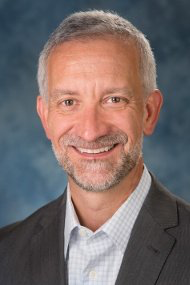
Meet Gerhard Pilcher ‘11. After graduating from NC State University with a BS in computer science, Pilcher spent more than 25 years in the private sector working in telecommunications and various other industries. After becoming more interested in data science, he decided to pursue the MSA. Since graduating, he has worked at Elder Research, Inc., a data science and analytics consulting firm, and is currently serving as the President and CEO of the firm. He also served as keynote speaker for the Institute’s inaugural Alumni Weekend in April 2019. We followed up with him to see how his time at the Institute shaped his career in data science.
What was your greatest highlight during your time as an MSA student?
Wow, just one? Graduation! It was a ton of work. I tried to complete most of my assignments in SAS, R, and SPSS to help me better learn the languages. The most lasting highlight is the relationships that developed during the long days and nights while working on various teams.
You are serving as the President and CEO of Elder Research, Inc. What impact do you hope the company will make on the field of analytics?
The reason Elder Research exists is to provide our clients with analytic consulting that enhances our client’s mission while maintaining a culture that values learning, humility, and work-life balance. Enhancing our clients’ missions implies we care about their mission as much as our own profitability and therefore maintain a high level of integrity in the analytic results we produce. Sometimes it’s hard to say, “This isn’t working, there’s no signal in the data.” We hope to be one voice of influence on rigorous validation of analytical models and practical application of analytics, which can help reduce the risk of disillusionment. Secondly, we hope to encourage a better balance of thought energy between data and analytics. Analytics has been overhyped recently leading companies to focus on analytics without much thought about the data required to fuel analytics. When companies do consider data, it is usually from the lens of technology (distributed computing and files systems in the cloud, etc.) rather than the value and quality of the data. Analytics is required to add value to data but good data is required to fuel analytics. The two cannot be considered independently.
You are the coauthor of the popular book Mining Your Own Business. What do you believe is the most important takeaway from your book that organizational leaders should implement?
Take the time to clearly define how data and analytics can support your strategic goals and then understand that the real work is in designing how analytics will be delivered to decision makers and the change management required to make analytics successful. Technology is only a tool that can help achieve the end results. Too many companies lead with technology and end up wasting money and time.
What advice can you offer to prospective MSA students?
Honestly reflect on your motivation for applying. We all have a very unique set of gifts. When you align your work with your natural gifts then you can find great joy and peace in your life. Analytics is a hot field with decent pay but you will not have much fun if that’s your only motivation. And, what happens when supply and demand begin to balance out?
What do you enjoy doing for fun outside of your analytics work?
I enjoy spending time with my wife (in the 37th year of our honeymoon!), family and friends, learning new things, reading, running, working on the farm, woodworking, and rock climbing.
Data Column | Institute for Advanced Analytics
The Collaborative Blog for Students in the Master of Science in Analytics
